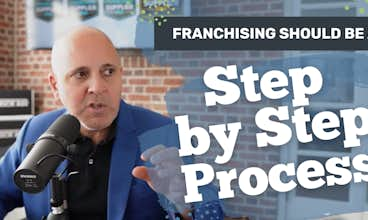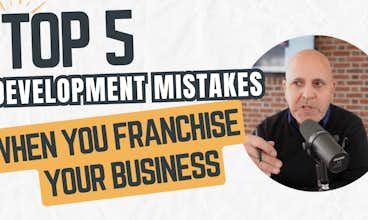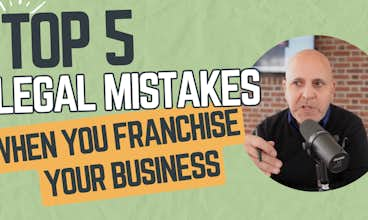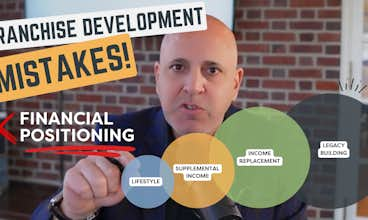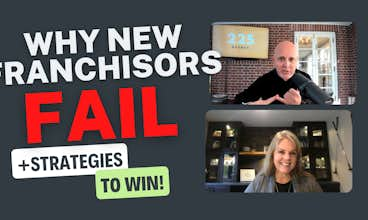Franchise Development Company Red Flags
‘One-stop shop’ franchise developers can expose your business to legal risks. Here’s what franchisors should know.
If you’re a seasoned entrepreneur with a track record of success, franchising your business should be an exciting next step for growing your brand. But what happens when you trust the wrong people to handle the franchising process?
Whether you’re the owner of a service-based business or a brick-and-mortar retail company, working with dishonest “one-stop shop” franchise development companies that promise to do everything from marketing to legal in-house can lead to lost time, missed opportunities and wasted money for emerging franchisors. From improperly established franchise systems to incorrect territory structures, lazy marketing and poorly drafted legal documents that lack the information necessary to close deals and protect your business, choosing a “one-stop shop” developer could leave your business exposed to costly legal problems in the future.
Franchise development nightmares to be aware of include:
- Your business is exposed to legal liability
- Your territory structures aren't properly defined
- Your FDD doesn't support growth
- Your Item 19 doesn't entice buyers
- Generic marketing doesn't support sales
In this article, we’ll discuss the red flags new franchisors should look out for when working with “one-stop shop” franchise developers – and the corrective steps you can take if your business falls prey to a disreputable franchise development company.
1. Your business is exposed to legal liability
Franchise development companies often offer “one-stop shop” packages that promise to handle every step of the franchising process in-house for a fixed fee, including:
Franchise development
Legal services
Marketing
Website design
Franchise sales
Other franchise-related services
Because of their convenience and seemingly affordable rates, “one-stop shop” developers can feel like a dream come true for startup franchisors hoping to save money while establishing a franchise quickly. But when something seems too good to be true, it often is – and sometimes, there are things franchise developers aren’t telling you.
First, because roughly 80% of the franchise development process involves some legal work, it’s important to determine whether you’ll be working directly with a licensed attorney as their client – rather than the developer’s client – before signing with a franchise developer. If not, your business could be exposed to future legal problems, including potential lawsuits, due to the absence of a direct attorney-client relationship.
In some situations, there is also a possibility that the developer might not be working with a licensed attorney but instead using boilerplate legal documents – a move that could leave your brand exposed to lawsuits and regulatory issues if those documents fail to meet all of your business’s legal requirements.
If you’ve already franchised your business using a “one-stop shop” developer, you can mitigate a potential nightmare scenario by having your legal documents, including your Franchise Disclosure Document (FDD), reviewed by a franchise attorney to ensure that your franchise system is properly structured, legally protected and adheres to federal and state franchise laws.
2. Your territory structures aren’t properly defined
Because territory structures and multi-unit franchise expansion agreements can vary by industry and depend on whether a brick-and-mortar location is necessary to operate, understanding industry norms and best practices is critical when defining franchise territories during the franchise sales process.
Unfortunately, dubious or inexperienced franchise developers sometimes improperly structure territories – especially when selling service-based franchises that don’t require physical locations. Often, this mistake occurs in the form of selling multiple “units” with individual FDDs, rather than one multi-unit development FDD.
Improperly structured territories can result in the following nightmare scenarios for franchisors:
Harming the franchisor’s Item 19 financial performance representations
Missed opportunities for franchise sales
Questions about fairness among franchisees and franchise brokers
Skepticism among brokers, who typically expect industry standards to be met
To avoid nightmares resulting from improper territory structures, seek the help of a reputable franchise attorney with experience structuring multi-unit territories.
3. Your FDD doesn’t support growth
As a mandatory legal document regulated by the Federal Trade Commission’s Franchise Rule, the FDD plays a critical role in every franchise system. Beyond regulations, though, the FDD is also an important tool that can make or break your franchise sales process – and the growth of your brand.
Often, “one-stop shop” developers will draft cookie-cutter FDDs for the businesses they franchise, neglecting to put in the time and effort necessary to establish the proper royalty structures for your brand’s specific needs. The result is a nightmare scenario where franchisors miss out on royalties they may have otherwise been entitled to, or get stuck in hard-to-terminate agreements with underperforming franchisees that can harm the entire franchise system.
To ensure your FDD supports growth and your royalty structure makes sense for your business, consult an experienced franchise attorney when developing your FDD or have an attorney review your existing FDD.
4. Your Item 19 doesn’t entice buyers
Item 19 of the FDD is an important tool for telling your franchise system’s economic story. Because of that, ensuring that it contains all the financial data necessary to help prospective buyers understand the value of your brand is critical.
Unfortunately, “one-stop shop” franchise developers often fail to follow best practices when drafting their clients’ Item 19 disclosures. In some situations, developers using cookie-cutter documents can omit important information about a franchise opportunity, including:
Geographic area
Territory sizes
Other important financial data
A competitively positioned FDD can make a difference when selling franchises. Because mistakes can result in missed sales and confusion on the part of brokers or prospective buyers, consult a licensed franchise attorney when developing your FDD. If you’ve already worked with a franchise developer to prepare your Item 19 disclosures and feel like something might be “off,” have an attorney review it.
5. Generic marketing doesn’t support sales
Making sure your brand’s marketing and sales materials are on-point is critical for success as a startup or emerging franchisor. Because of that, having a great franchise sales website is crucial for attracting the right franchisee candidates – and communicating the value and benefits of joining your franchise system.
Although “one-stop shop” franchise developers often offer in-house web design services as part of their all-inclusive franchising packages, generic one-size-fits-all franchise sales websites usually don’t contain enough information about a brand to entice buyers to join the franchise system. Many don’t even contain the basic information necessary for a prospective franchisee to understand the brand’s value.
When developing a franchise sales website, it’s important ensure the following information is communicated:
Why your brand matters
The type of business being offered, its industry and category
How buying a franchise can help franchisees meet their personal or professional goals
Specific details about the training and support provided to franchisees
What differentiates your brand from competitors
Other important information, like territory structures and frequently asked questions
By working with a professional web designer and marketing team that understands franchise sales, you can attract the right candidates while making sure they have the information necessary to understand what your brand is about and how much it has to offer.
As a law firm that specializes in franchise development, we receive calls regularly from frustrated franchisors who have been let down by “one-stop shop” developers and are convinced franchising doesn’t work. But we know it does – and we know how to do it right. By skipping the shortcuts and working with experienced professionals, you can avoid the nightmare scenarios and grow your franchise the right way.
Learn more about Franchise Developer Nightmares and False Franchise Sales Promises


